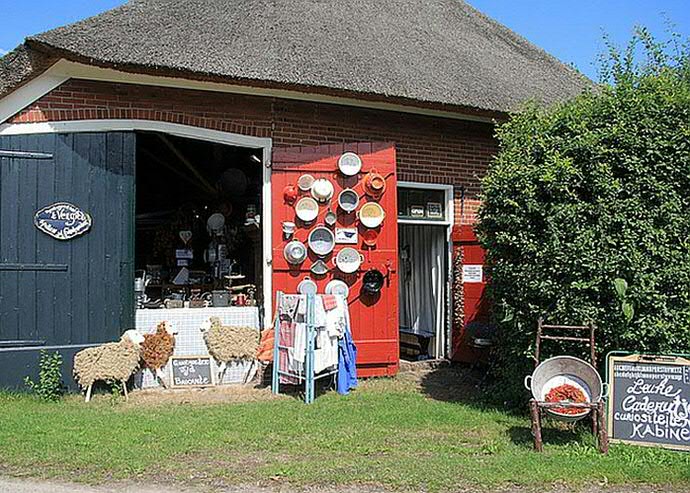Startende ondernemers laten zich niet tegenhouden door krimp

Ondernemerschap speelt een belangrijke rol in de leefbaarheid van het krimpgebieden. En bovendien doen krimpregio’s het verrassend goed als vestigingsplaats voor nieuwe ondernemingen. Dat blijkt uit onderzoek van bedrijfskundige Heike Delfmann. Zij promoveert op 23 april aan de Rijksuniversiteit Groningen.
Delfmann onderzocht de rol van ondernemerschap binnen krimpgebieden, met speciale aandacht voor gebieden waarin sprake is van vergrijzing. ‘Het idee is altijd: krimp is negatief. Maar ik concludeer dat in plattelandsgebieden met sterkere krimp juist relatief veel nieuwe bedrijven worden opgericht.’
Beweegredenen starters
Op basis van diepte-interviews onderzocht Delfmann de beweegredenen van diverse starters. ‘Juist in vergrijzende plattelandsgebieden gaat men er vaak vanuit dat nieuwe bedrijven uit nood geboren kindjes zijn die niet zullen groeien. Het idee is dat ondernemers in krimpgebieden voor zichzelf beginnen omdat ze hun vaste baan verliezen en vervolgens niet kunnen of willen verhuizen. Maar dat beeld heb ik in mijn onderzoek niet gevonden’, aldus Delfmann, die casestudies deed in Northumberland (Noordoost-Engeland) en het Drentse Westerveld.
Delfmann: ‘De belangrijkste drijfveren om te starten zijn de wens om zelfstandig te zijn of een uit de hand gelopen hobby. Daarnaast waren er natuurlijk ondernemers die vanwege een negatieve push zoals werkloosheid kiezen voor een eigen bedrijf, maar ook die mensen hadden eerder al overwogen om voor zichzelf te beginnen.’
Kwaliteit van leven
Nieuwe ondernemers blijken bewust te kiezen voor vestiging op het platteland. De prioriteit van deze ondernemers ligt bij de kwaliteit van leven. Ze kiezen voor een woonlocatie ongeacht de kansen op de arbeidsmarkt. De keuze voor een landelijke woonlocatie is sterk verbonden aan de wens voor een bepaalde levensstijl. Delfmann: ‘De motivatie is niet het maximaliseren van winst, maar persoonlijk geluk.’
De kleinschalige bedrijven die voorvloeien uit deze keuze voor ondernemerschap op het platteland passen niet alleen bij de landelijke omgeving, ze hebben vaak ook een toeristische functie. En, belangrijker nog, ze brengen levendigheid in de regio. Door de sociale interactie tussen bewoners te bevorderen hebben ze een positieve uitwerking op de kwaliteit van leven in de gemeenschap. Delfmann: ‘Ook als deze bedrijven economisch maar een kleine rol spelen, voegen ze vaak veel toe aan de gemeenschap. Soms is de rol van deze bedrijven in de gemeenschap zelfs groter dan de rol die ze spelen in de lokale economie.’
Stimulans voor de werkgelegenheid
‘De nieuwe bedrijven in krimpgebieden leveren een positieve bijdrage aan de werkgelegenheid in de regio, al creëren start-ups in krimpgebieden relatief minder werkgelegenheid dan ondernemerschap in groeigebieden,’ stelt Delfmann. Allereerst is er het directe effect op de werkgelegenheid: iemand begint een winkel en neemt iemand anders aan om in die winkel te werken. Maar nieuwe bedrijven leiden ook indirect tot een toename van de werkgelegenheid in een gebied, ook als het gaat om zzp’ers. ‘Een nieuw bedrijf stimuleert de concurrentie in de omgeving’, aldus Delfmann. ‘Deze bedrijven passen zich aan, gaan ten onder of worden juist beter onder de druk van de toegenomen concurrentie.’
Aanbevelingen
Gemeentelijke beleidsmakers zijn gebaat bij haar bevindingen, denkt Delfmann. ‘Het is belangrijk om nieuwe bedrijvigheid te blijven stimuleren en faciliteren in krimpregio’s. Zorg dat mensen zich betrokken voelen bij de gemeenschap. Juist die betrokkenheid is een zeer belangrijke motivator voor potentiële en bestaande ondernemers.’
Curriculum Vitae
Heike Stephanie Delfmann (1984, Osnabrück) studeerde Bedrijfskunde en deed een master Small Business and Entrepreneurship aan de Rijksuniversiteit Groningen. Haar onderzoek verrichtte ze bij de afdeling Economische Geografie van de Faculteit Ruimtelijke Wetenschappen aan de RUG. De titel van haar proefschrift luidt:‘Understanding entrepreneurship in the local context’. Promotor is prof.dr. Philip McCann en copromotor is prof.dr. Jouke van Dijk. Dr. Sierdjan Koster was de dagelijkse begeleider van het onderzoek. Sinds februari werkt Delfmann als docent op de afdeling Bedrijfskunde van de Noordelijke Hogeschool Leeuwarden.
Meer nieuws
-
10 februari 2026
‘Regeneratie begint waar moed en verbeeldingskracht samenkomen’
-
09 december 2025
Zijn robots de oplossing?
